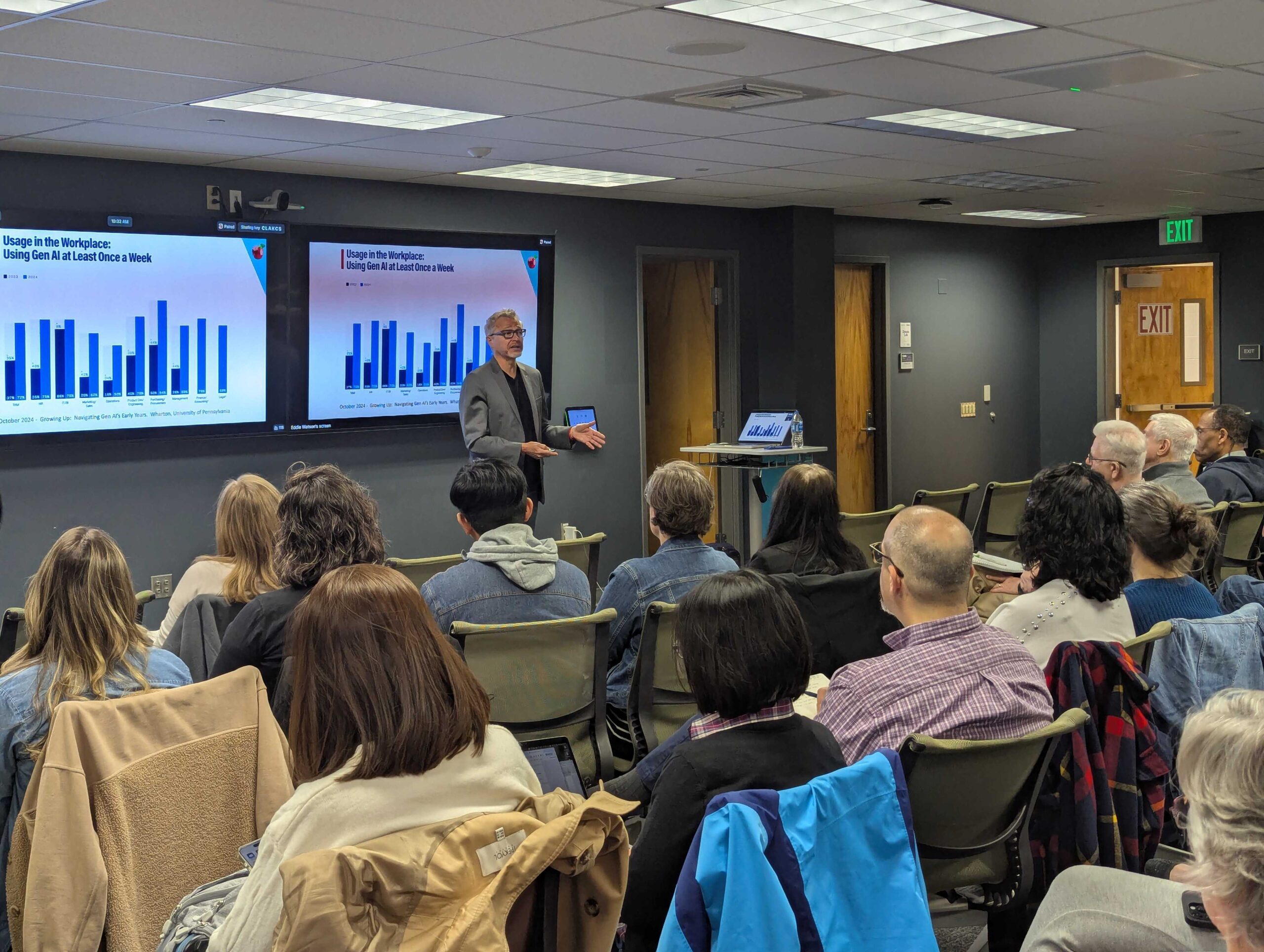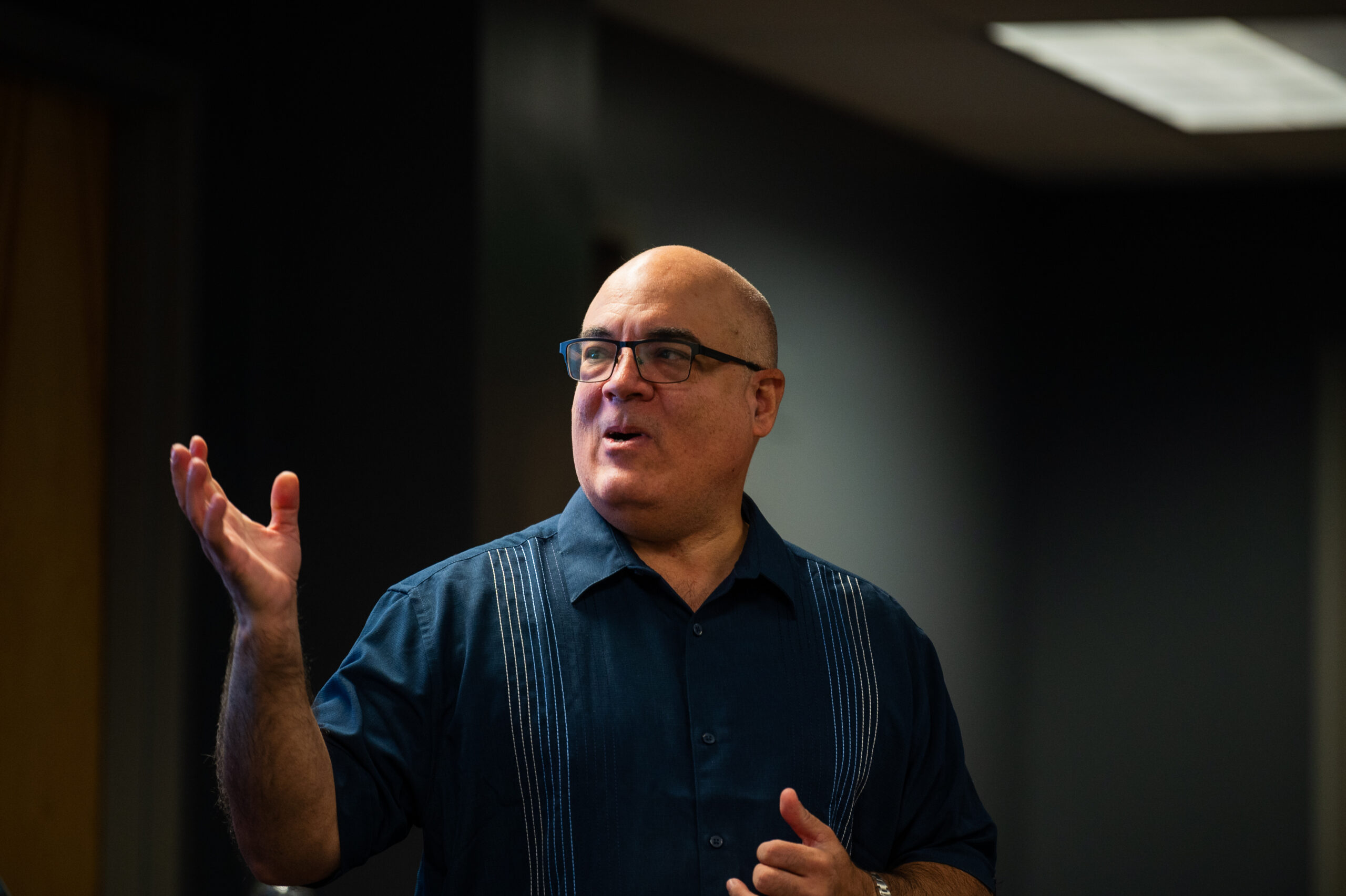The Dreamery Speaker Series
The Dreamery Speaker Series (DSS) hosts industry experts from other institutions to address relevant teaching and learning topics through interactive presentations geared toward faculty, staff, and students.
Upcoming Featured Speaker
Check back for the fall speaker announcement!
Previously Featured Speakers
Spring 2025 Speaker: Dr. Edward Watson
Edward Watson, Ph.D., is the Vice President for Digital Innovation at the American Association of Colleges and Universities (AAC&U). He is also the founding director of AAC&U’s Institute on AI, Pedagogy, and the Curriculum. Prior to joining AAC&U, Dr. Watson was the Director of the Center for Teaching and Learning at the University of Georgia (UGA) where he led university efforts associated with faculty development, TA development, learning technologies, and the Scholarship of Teaching and Learning. He continues to serve as a Fellow in the Louise McBee Institute of Higher Education at UGA and recently stepped down after more than a decade as the Executive Editor of the International Journal of Teaching and Learning in Higher Education. His most recent book is Teaching with AI: A Practical Guide to a New Era of Human Learning (Johns Hopkins University Press, 2024).
During his visit, Edward detailed the challenges and opportunities that have emerged for higher education in the age of AI, especially in terms of pedagogical practice and student learning. He highlighted concrete approaches and strategies higher education can adopt, both within the classroom and across larger curricular structures, to best prepare students for the life after graduation. Additionally, Edward facilitated a workshop focused on how faculty can ensure their students achieve the learning outcomes of their course while also engendering AI competencies and literacies that are of increasing demand in the world of work. Assignment design, feedback, and grading were all key topics.


Fall 2024 Speaker: Dr. Luis Perez
As the Disability & Digital Inclusion Lead for CAST, Luis promotes the creation, delivery and use of high quality accessible educational materials and technologies to support equitable learning opportunities for all learners. Luis is embedded with the Postsecondary and Workforce Development group at CAST that works to increase access to middle- and high-income careers for populations underrepresented in the workforce, including people with disabilities. Luis’s perspective is informed by his own lived experience as a person with a disability/disabled person and multilingual learner.
During his visit, Luis provided insights from the learning sciences that challenge all educators to think differently about ability and disability, including the latest updates to the Universal Design for Learning Guidelines pioneered at CAST as a framework for designing barrier-free learning experiences. Additionally, Luis facilitated a workshop on best practices for creating accessible content. Luis ended the day by sharing how UDL principles can create inclusive, flexible, and student-centered learning environments through curriculum design, assessments, classroom materials, and student interactions.
Spring 2024 Speaker: Dr. Joseph Yun
Yun is the artificial intelligence and innovation architect and a research professor of electrical and computer engineering at the University of Pittsburgh. Yun’s research is primarily focused on novel AI/ML algorithms/technologies, user-centric analytics systems, computational advertising, novel technologies such as blockchain, and societal considerations of AI-based advertising and marketing (e.g., privacy, ethics). One specific focus area of Yun’s current research is in the realm of misinformation and disinformation and the technologies that support its distribution. He is also an affiliate of Pitt Cyber and the Collaboratory Against Hate.
During his visit, Yun presented on the transition from conventional artificial intelligence approaches to generative AI and explored the significant impact this evolution has had—and is expected to continue having—on both academic environments and societal operations at large. Additionally, Yun facilitated a workshop on what the future of higher education entails with generative AI. The session served as a brainstorming forum for attendees to leverage their insights on AI to formulate precise, context-driven questions about the future of higher education, reflecting attendees’ diverse disciplines and experiences.


Fall 2023 Speaker: Adam Finkelstein
Adam Finkelstein is Associate Director of Learning Environments (Physical and Digital) at Teaching and Learning Services at McGill University where he develops university-wide initiatives to improve teaching and learning environments. His responsibilities include both the physical (learning spaces) as well as the digital (online ecosystem of teaching and learning tools). He and his team have worked with thousands of instructors to help them improve their teaching and learning with many faculty development initiatives, from active learning, to assessment, to inclusive space design. Adam has over 20 years of experience with innovative physical and digital learning spaces including designing, teaching, and assessing them.
During his visit, Finkelstein presented on how the design of physical and digital spaces facilitates active and inclusive learning, highlighting the influence learning environments has on student engagement and learning. Additionally, Finkelstein facilitated an interactive workshop on developing active and inclusive strategies to engage students in physical and digital classroom spaces. Finkelstein provided instructors with practical examples and scenarios on how to take advantage of the affordances provided by physical or digital spaces to better support student learning.
Spring 2023 Speaker: Dr. Stephen Monroe
Stephen Monroe is the Chair and Assistant Professor of Writing and Rhetoric at the University of Mississippi (UM), where he also co-chairs the AI Writing Task Force. Some of his previous work includes being a faculty member at the Center for the Study of Southern Culture and a steering committee member at the Sarah Isom Center for Women and Gender Studies.
Monroe presented Pilot, Don’t Panic: Advice for Teaching with Artificial Intelligence (AI) Writing Generators and discussed the following:
- an Introduction to AI for faculty and staff to explore art-creation tools
- how instructors can be proactive in their approach to AI text generator tools
- shifting the perspective to teaching students data literacy
- how AI generators will impact policy decisions and ethical considerations
- the future of AI and how it can be leveraged within higher education


Fall 2022 Speaker: Dr. Tanya Joosten
As the Director of Digital Learning Research and Development at the University of Wisconsin-Milwaukee, Dr. Tanya Joosten is a pioneer in her field. She is also the Executive Director of the National Research Center for Distance Education and Technological Advancements.
Joosten’s discussion on “Approaching Intentionality: Factors That Influence Student Success” focused on moving from instinct to intentionality in rethinking instructional practices in courses from onsite to online. She also led a conversation about “Considerations for Equity-Minded Practices,” emphasizing the importance of designing courses with equity in mind.
Talk with Us
Have a great idea? Get in touch with us! We can help you identify the right technologies to meet your pedagogical needs, or develop something completely new.